 Web Front-end
Web Front-end JS Tutorial
JS Tutorial Methods to give JavaScript similar programming capabilities as Lambda expressions_javascript skills
Methods to give JavaScript similar programming capabilities as Lambda expressions_javascript skillsBut I later told people that because it accepts too many parameters, if the smart prompts are not clearly written, even I often can’t figure out how to use them.
However, accepting many parameters will not only make it easier to use them incorrectly, but also cause another problem. This is why I wrote the thing released today.
Let’s take a look at the full function signature of the JS version of the page number rendering component:
function pnView(
currentPage, actionCurrent,
beginPage, endPage,
actionBegin, actionEnd,
currentSiblings, actionCurrentSibling,
preventFolding, actionFolding,
endOfBegin, beginOfEnd ,
actionBeginSibling, actionEndSibling
)
As you can see, this fully customized function signature accepts 14 parameters, half of which - that is 7 parameters are required to accept the callback function.
The resulting problem is that you need to manually write multiple "function(){}" and other character combinations, like this:
function ww(s) { document.write(s); }
function ws(n) { ww(' (' n ') '); }
pnView(14, function (n) { ww(' [' n '] ') },
1, 27,
function (n) { ww('| '); }, function (n) { ww(' ' n ' >|'); },
2, ws,
1, function () { ww(' ... '); },
2, 2,
ws, ws
);
When I tested this component on the web page, I felt that I missed the Lambda expression in C# - although Some people and some JS frameworks will call anonymous functions "Lambda expressions", but in fact that is only equivalent to "anonymous delegates/functions" in C#, and the (surface) characteristic of Lambda is to use a short syntax pattern to reflect a (Callback) function/procedure (or action) logic without being distracted by "delegate" or other keywords.
For this reason, I wrote this module that can translate JS code and translate a specific pattern into function definitions.
After using this module, the previous call can become like this:
eval(function () {
var ww = (s, document.write(s));
var ws = (n, ww(' (' n ') '));
pnView(14, (n, ww(' [' n '] ')),
1, 27,
(n , ww('| ')), (n, ww(' ' n ' > |')),
2, ws,
1, (0, ww(' ... ')),
2, 2,
ws, ws
);
}.lamda())();
module is as follows:
/*!
L-amda "a-Lambda", a module provides Alternate "Lambda" style programming ability for JavaScript.
Created By NanaLich. 2010-09-08
This module is published under WTFPL v2, so you just DO WHAT THE Fxxx YOU WANT TO with it.
*/
!function () {
function attachEntry(o, a, m) {
var i, j, n;
o = [].concat(o);
//if (!(o instanceof Array)) o = [o];
while (i = o.shift()) {
for (j in a) {
if (!i[n = a[j]]) i[n] = m;
}
}
}
var rx0 = /^s*(0|NaN|null)s*,$/;
var rx1 = /([W]s*)((s*0s*,|(?:s*[a-z_$][w$]*s*,) )|"(\[sS]|[^x22])*"|'(\[sS]|[^x27])*'/gi;
var rx2 = /)/g;
function rxGetFlags(rx) { // 取出正则表达式的创建选项
return (rx.global ? 'g' : '') (rx.ignoreCase ? 'i' : '') (rx.multiline ? 'm' : '');
//return //([gim]*)$/.exec('' rx)[1];
}
attachEntry(RegExp, ['getFlags'], rxGetFlags);
attachEntry(RegExp.prototype, ['getFlags'], function () {
return rxGetFlags(this);
});
function translateLambda(s) {
if (typeof (s) != 'string') s = '' s;
var x = new RegExp(rx1.source, rx1.getFlags());
var y = new RegExp(rx2.source, rx2.getFlags()); // 由于firefox、safari等浏览器对全局匹配正则表达式有过度的优化,所以这里采用一种迂回的办法创建不重复的正则表达式实例
var m, l = 0, r = '';
while (m = x.exec(s)) {
var c = m[0], h, p, q, t;
switch (c.charAt(0)) { // 判断期待的语法成分
case '$':
case ')':
case ']':
case '"':
case "'":
continue; // 函数传参,跳过
}
h = m[2];
if (rx0.test(h))
h = '';
else
h = h.substr(0, h.length - 1); // 去掉末尾的逗号
r = s.substring(l, p = m.index); // 在结果字符串上附加之前余留的内容
y.lastIndex = l = p c.length; // 从逗号之后开始寻找右括号
while (q = y.exec(s)) {
q = q.index;
try {
t = 'return ' s.substring(l, q) ';';
new Function(t); // 语法测试
//r = c 'function(' h '){ ' translateLambda(t) ' }'; // 翻译里面的内容
r = m[1] 'function(' h '){ ' translateLambda(t) ' }'; // 翻译里面的内容
x.lastIndex = l = q 1; // 下一次查找从括号之后开始
break;
} catch (ex) { }
}
if (!q) l = p; // 说明找不到右括号或者有效的代码,直接附加所有匹配的内容
}
try {
r = s.substr(l);
if (/[w$]*|"(\[sS]|[^x22])*"|'(\[sS]|[^x27])*'/.exec(r)[0] == 'function') // 粗略判断产生的是不是函数(可以应付绝大部分情况)
r = '0,' r; // 使用这种“怪”形式可以在所有浏览器(包括IE)中得到预期的效果
new Function(r); // 语法测试
return r;
} catch (ex) { // 失败,返回原文
return s;
}
};
var lamdaAliases = ["translateLambda", "lambda", "lamda"];
attachEntry([Function, String], lamdaAliases, translateLambda);
attachEntry([Function.prototype, String.prototype], lamdaAliases, function () {
return translateLambda(this);
});
} ();
如果和C#中的Lambda表达式相比的话,我的这个模块还是有很多不足的,不过现在这个样子已经让我很满意了,至少我不用再写太多的“function”了。
简单来说,这个模块的规格特性是这样的——
优点:
减少编写代码时“function”的出现次数;
使用可以在一般的JavaScript编辑器中正常编辑的语法模式(pattern),直接写在函数体中不会导致语法错误。
局限性:
在任何时候使用这个模块都必须调用转译方法(“translateLambda”、“lambda”或者“lamda”)和eval函数,无法省略;
如果存在一个函数A,不可能通过对A进行处理来达到转译传递至A的参数的目的(也就是说a.lambda()或者类似的操作并不会让a((x, x * 2))等同于a(function(x){ return x * 2; }));
不能包含表达式之外的任何语句、不能包含使用“;”来分隔的多条语句。
缺点:
连续出现的括号可能会让代码变得难以理解;
任何编辑器都无法为Lambda表达式提供语法高亮;
存在错误地转译现有代码的可能性——这个模块选择进行匹配的模式是在正常的代码中没有实用价值、也通常不会出现的模式,如:(x, x * 2)等价于单纯的x * 2、(0, a.method())等价于单纯的a.method(),所以这个缺点影响到实际代码的可能性无限趋近于0。
以下是几种不当的用法:
1、使用这个模块并不会节省很多代码量的时候:本末倒置。
eval(function(){ // Not only did it not reduce the amount of code, but it also increased
window.onload = (0, alert('Loading completed!'));
}. lambda());
2. Translate functions that accept parameters: This situation has been mentioned before.
eval(somefunction.lambda())((x, x.toString(16))); // some function may produce unexpected results, and the parameters received will be the results of x.toString(16) (if x has not been defined here, it will also produce a "variable does not exist" exception), rather than a callback function.
3. Avoiding syntax checking in order to use this module:
Because you are using syntax that is valid in JavaScript but has no practical value, there is no need to circumvent syntax checking.
eval("somefunction((x, x.toString( 16)))".lamda()); // Loss of syntax checking, may cause accidents during runtime
4. Use too many operations in (pseudo) Lambda, even more Statements:
When designing this module, I did not find a pattern that can use multiple statements and pass the syntax check. The reason is that when using multiple statements in a Lambda expression, "function", The amount of code added by a few characters such as "return" is usually negligible. Using Lambda expressions in this way deviates from the original intention.
eval(function(){ somefunction((x, y .something(x); return x.toString(16))); }.lamda())(); // Syntax error
eval(function(){ somefunction((x, y.something(x), x.toString(16))); }.lamda())(); // It is easy to cause ambiguity in understanding
eval(function(){ somefunction((x, x)); }.lamda()) (); // Simple expressions can be accepted
Best use cases:
Many people now like to write their code in a closure when writing JavaScript, like this You can avoid the global scope pollution problem, like this:
(function(){
// All the code is placed here
})();
- and this "big" closure happens to use this module Best occasion:
eval(function(){ // Add eval before the brackets
// All the code is placed here
}.lamda())(); // Add .lamda() inside the brackets
Codeplex went crazy yesterday , there are always errors in code and release uploads. Considering that the use cases of this module are relatively limited and not suitable for people who lack JavaScript experience, the source code is not packaged and downloaded separately - please copy it directly from the text if necessary.
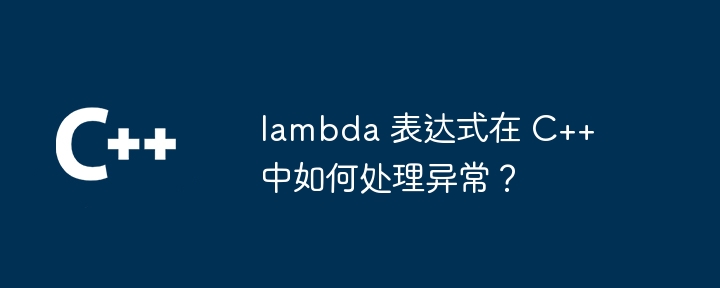 lambda 表达式在 C++ 中如何处理异常?Apr 17, 2024 pm 12:42 PM
lambda 表达式在 C++ 中如何处理异常?Apr 17, 2024 pm 12:42 PM在C++中,使用Lambda表达式处理异常有两种方法:使用try-catch块捕获异常,并在catch块中处理或重新抛出异常。使用std::function类型的包装函数,其try_emplace方法可以捕获Lambda表达式中的异常。
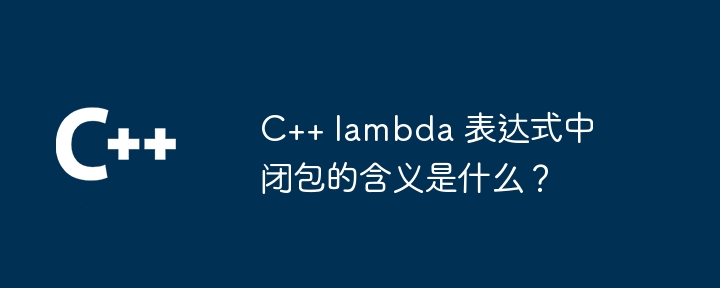 C++ lambda 表达式中闭包的含义是什么?Apr 17, 2024 pm 06:15 PM
C++ lambda 表达式中闭包的含义是什么?Apr 17, 2024 pm 06:15 PM在C++中,闭包是能够访问外部变量的lambda表达式。要创建闭包,请捕获lambda表达式中的外部变量。闭包提供可复用性、信息隐藏和延迟求值等优势。它们在事件处理程序等实际情况中很有用,其中即使外部变量被销毁,闭包仍然可以访问它们。
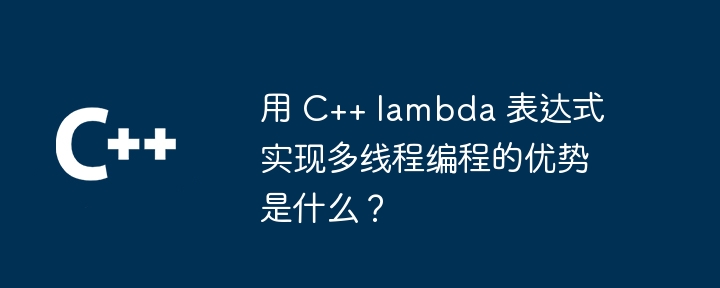 用 C++ lambda 表达式实现多线程编程的优势是什么?Apr 17, 2024 pm 05:24 PM
用 C++ lambda 表达式实现多线程编程的优势是什么?Apr 17, 2024 pm 05:24 PMlambda表达式在C++多线程编程中的优势包括:简洁性、灵活性、易于传参和并行性。实战案例:使用lambda表达式创建多线程,在不同线程中打印线程ID,展示了该方法的简洁和易用性。
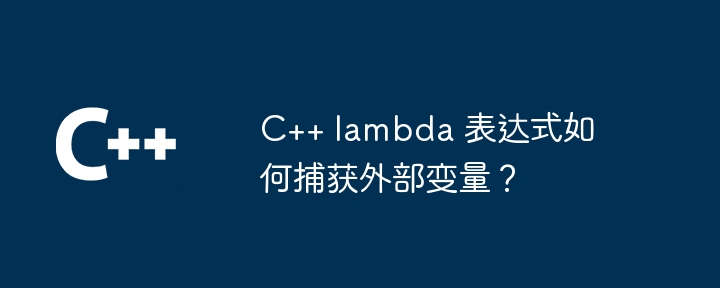 C++ lambda 表达式如何捕获外部变量?Apr 17, 2024 pm 04:39 PM
C++ lambda 表达式如何捕获外部变量?Apr 17, 2024 pm 04:39 PM在C++中捕获外部变量的lambda表达式有三种方法:按值捕获:创建一个变量副本。按引用捕获:获得变量引用。同时按值和引用捕获:允许捕获多个变量,按值或按引用。
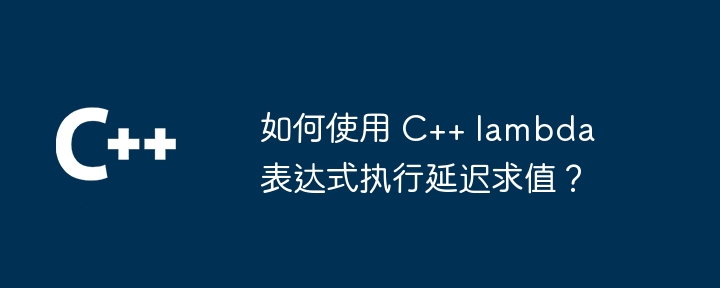 如何使用 C++ lambda 表达式执行延迟求值?Apr 17, 2024 pm 12:36 PM
如何使用 C++ lambda 表达式执行延迟求值?Apr 17, 2024 pm 12:36 PM如何使用C++lambda表达式执行延迟求值?使用lambda表达式创建延迟求值的函数对象。延迟计算推迟到需要时才执行。仅当需要时才计算结果,提高性能。
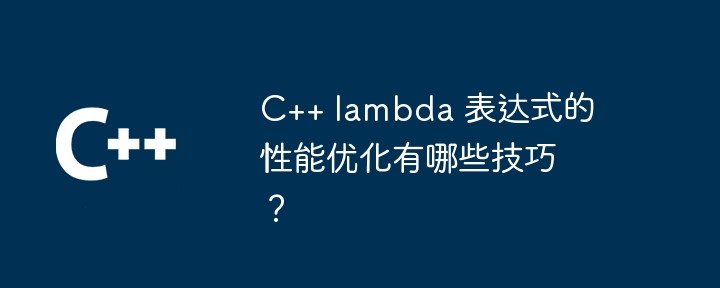 C++ lambda 表达式的性能优化有哪些技巧?Apr 17, 2024 pm 05:45 PM
C++ lambda 表达式的性能优化有哪些技巧?Apr 17, 2024 pm 05:45 PM优化C++Lambda表达式的性能技巧包括:避免创建不必要的lambda对象通过std::bind显式捕获最小的对象使用std::move移动捕获的变量以避免复制优化lambda体,避免不必要的内存分配、重复计算和全局变量访问
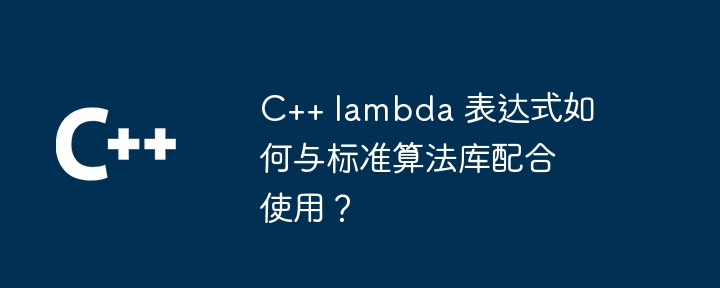 C++ lambda 表达式如何与标准算法库配合使用?Apr 17, 2024 pm 05:51 PM
C++ lambda 表达式如何与标准算法库配合使用?Apr 17, 2024 pm 05:51 PMC++Lambda表达式与标准算法库紧密协作,允许创建匿名函数,简化对数据的处理。具体用途包括:排序向量:使用lambda表达式对元素进行排序。查找元素:使用lambda表达式在容器中查找特定元素。
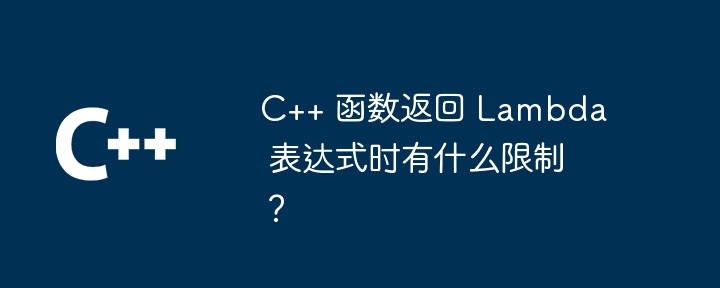 C++ 函数返回 Lambda 表达式时有什么限制?Apr 20, 2024 pm 12:42 PM
C++ 函数返回 Lambda 表达式时有什么限制?Apr 20, 2024 pm 12:42 PM回答:C++函数可以返回Lambda表达式,但存在以下限制:限制:Lambda表达式应捕获存储类型(CapturesbyValue)Lambda表达式不能返回局部变量Lambda表达式不能返回Lambda表达式


Hot AI Tools

Undresser.AI Undress
AI-powered app for creating realistic nude photos

AI Clothes Remover
Online AI tool for removing clothes from photos.

Undress AI Tool
Undress images for free

Clothoff.io
AI clothes remover

AI Hentai Generator
Generate AI Hentai for free.

Hot Article

Hot Tools

SublimeText3 English version
Recommended: Win version, supports code prompts!

Safe Exam Browser
Safe Exam Browser is a secure browser environment for taking online exams securely. This software turns any computer into a secure workstation. It controls access to any utility and prevents students from using unauthorized resources.

Zend Studio 13.0.1
Powerful PHP integrated development environment

DVWA
Damn Vulnerable Web App (DVWA) is a PHP/MySQL web application that is very vulnerable. Its main goals are to be an aid for security professionals to test their skills and tools in a legal environment, to help web developers better understand the process of securing web applications, and to help teachers/students teach/learn in a classroom environment Web application security. The goal of DVWA is to practice some of the most common web vulnerabilities through a simple and straightforward interface, with varying degrees of difficulty. Please note that this software

mPDF
mPDF is a PHP library that can generate PDF files from UTF-8 encoded HTML. The original author, Ian Back, wrote mPDF to output PDF files "on the fly" from his website and handle different languages. It is slower than original scripts like HTML2FPDF and produces larger files when using Unicode fonts, but supports CSS styles etc. and has a lot of enhancements. Supports almost all languages, including RTL (Arabic and Hebrew) and CJK (Chinese, Japanese and Korean). Supports nested block-level elements (such as P, DIV),





